The making of performance makers
Keith Gallasch: interview, Chris Ryan, University of Wollongong
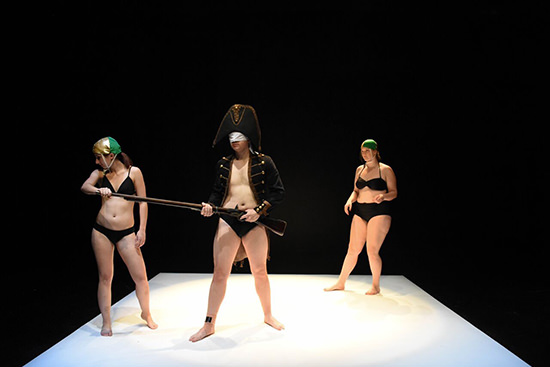
The One Day of the Year, Performance/Theatre students, University of Wollongong
Chris Ryan’s great pleasure in teaching and directing is evident at every stage of our discussion about the courses he and his colleagues conduct in Performance and Theatre in the University of Wollongong’s School of the Arts, English and Media. He says it’s about taking students “into the unknown” in an era of pervasive social media “where not having some sort of integrity in just being can interfere in what it is to perform.”
Ryan’s accomplished fellow staff are Professor Sarah Miller, Head of School of the Arts, English and Media, a writer, producer and curator; Janys Hayes, Lecturer in Theatre and Performance and theatre director; Tim Maddock, Lecturer in Theatre and Performance, director and designer; and Catherine McKinnon, Lecturer in Writing, Theatre and Performance and novelist, playwright and director. Ryan is Lecturer in Theatre and Performance, a director and dramaturg. Postgraduate scholars include some key figures from Sydney’s performance scene: Malcolm Whittaker, Deborah Pollard, Nikki Heyward, Eleanor Brickhill and Nigel Kellaway, while tutors include Pollard, Linda Luke and Matt Prest.
Independence & ensemble
I associate the University of Wollongong with inventive, idiosyncratic, independent artists—the ensembles Team MESS and Appelspiel and individual performance makers like Malcolm Whittaker and Nat Randall. I ask Ryan why this is so. “Because,” he says, “our students get to work with a lot of independent artists and the post-dramatic world has really shifted the nature of training.”
He emphasises the importance of ensemble—“how you encourage students to be responsible for the whole work. It comes from task-based responsibility”—and the benefit of working in “a very trusting climate” at UOW. He also says that he and his fellow teachers engage about their work with students in “a dialogue that goes on beyond the rehearsal room,” providing a shared view of student development. As well, students commit themselves contractually to courses and productions. It’s not surprising then that UOW graduates are notable collaborators and facilitators—Ryan reels off examples, which we’ll come to later. He believes that independence comes from the way courses and productions are structured.
I ask how a teacher can generate a sense of ensemble. “With a cast of say eight to 15, it’s group dynamics and really we can have no control over it, but we expose everyone to the pragmatics of mounting a production. I’ll often ask, what do we need to do to get this show on; including things like, what to do about absences from rehearsals?” Dynamics will vary: “Each production has its own way of working.”
Process & progress
I ask how students prepare to work on a play. Research comes first, “with Bachelor of Performance students in their second year working in pairs on plays for two to three weeks and then presenting their findings—the cultural undercurrents, the politics, the life of the writer. A base in research gives you choices.”
Is there much subsequent discussion once work has begun? “Not a lot of talk. I say, put your thoughts online so I can see what you’re thinking. Do, Do. Do.” At the same time Ryan ranks reflection highly, “asking course tutors—the fellow artists we bring in—to encourage it, for example to make students do a score: detailed documentation of their journey through an evolving production. In the bigger picture, it becomes, “Take time off and look at what you’ve done and ask does it fit with why you’re here.”
Ways of working: dramatic & post-dramatic
Students are exposed to a range of plays, adaptations and ways of working. Ryan cites a third year production in which director Deborah Pollard had students read Alan Seymour’s Australian classic The One Day of the Year (1958) and use it as a jumping-off point for creating a performance that “managed to merge the ‘rage cultures’ of the Melbourne Cup, the Cronulla Riots and Anzac Day.”
Ryan himself relishes having someone rewrite or adapt a classic: “then you can do the post-dramatic thing, looking at and making choices.” Alex Tutton, a 2012 graduate of the UOW Bachelor of Performance program, has adapted the Frank Wedekind plays Franziska and Spring Awakening for Ryan. The latter became Teenage Wildlife. Now the pair are working on a version of the Lulu plays. Ryan underlines the value of the teaching model of “having the writer in the room,” and one who is pedagogically aware. Tutton, he says, “pops in once a week to rehearsals and often gets on the floor, directs and answers students’ questions.”
Another kind of experience comes from having a play written for the students. Cath McKinnon, herself a playwright, brings writers to the course. “Tom Holloway came with a concept for Lyrebird, saw the students he was writing for, went off to write, came back several times, right up to changing the ending. About texting and sexting in the last two years of high school, it was the perfect play for students.”
Very different works, says Ryan, come with Linda Luke, tutor, Body Weather exponent and performance maker, in her “pulling apart Bergman’s Through A Glass Darkly, The Seventh Seal and Persona or doing Jenny Kemp’s Still Angela. Each of our productions are totally different animals.”
Luke and Ryan (Feldenkrais) share movement teaching for second year students. Ryan especially “likes to use fight choreography. It’s a, b, c and you’ve got to be safe and you’ve got to act on top of that. So it’s actually quite difficult. Get fit. Watch The Bourne Identity!” Then there’s training in voice and singing. It’s the responsibility of the students to put their skills together in their own tool box. You can’t do that for them.”
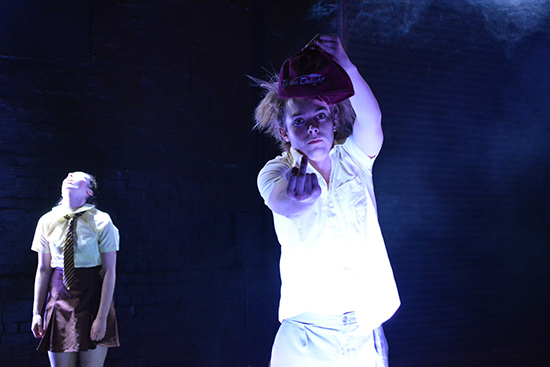
Teenage Wildlife, Performance/Theatre students, University of Wollongong
UOW doesn’t offer a directing course per se, which hasn’t prevented graduates from making significant work, like Jackson Davis and the re:group collective’s Lovely, a tribute to the late Philip Seymour Hoffman, or the creations of Team MESS. Lovely (read the RealTime review) was a masterful choreographing of swirling bodies, props and cameras, which as Ryan observes, “meant that everyone was right on the same page.”
There is a mentoring program for students who want to direct as part of their final year and opportunities to direct in SIP—Student Initiated Projects—which is run by Ryan. Applicants propose and are selected to create 20-minute works for which they are responsible for all aspects of production, including front of house, letters of agreement and publicity, guided by Professor Sarah Miller so that students build a sense of what’s involved in being a self-producing artist.
I ask what the works are like. “Interesting and all over the place. Maybe they’re making works of genius? Tim Maddock and I mentor, dropping in and out. One of our current students, Steffani Gardner, has just directed her second SIP production, the first was a devised work mentored by me and the second Vanessa Bates’ Checklist for an Armed Robbery, mentored by Tim.”
When does the course finally come to fruition? Ryan says that he asks of his final-year students, “What is it you want out of this last semester? Write it down. Let’s talk about it. That may be the basis for a scene in the show.” Final year productions, usually text-based such as with Teenage Wildlife and Jackson Davis’ adaptation, Ur-Hamlet, are then staged at PACT Theatre for a welcoming Sydney audience.
Recent graduates at work
We chat about UOW graduates of the last 4-5 years who are appearing in or making a fascinatingly diverse range of productions. Solomon Thomas, says Ryan, “is a bundle of positive energy,” who graduated with Honours in 2013, has worked with My Darling Patricia, touring with The Piper to Edinburgh and now with Erth Visual & Physical Inc to Japan as a puppeteer. Christine Woodhouse (2013) was awarded the PACT BMM Travelling Fellowship which took her to UK, then undertook a development project mentored by Latai Taumoepeau and is currently part of PACT’s Rapid Reponse Team. Cath McNamara (2014) worked on Victoria Hunt’s production, Tangi Wai…the cry of water and also has been working with Erth and was in producer-director Christine Dunstan’s The Defence performed in Sydney and at Perth’s The Blue Room in 2015.
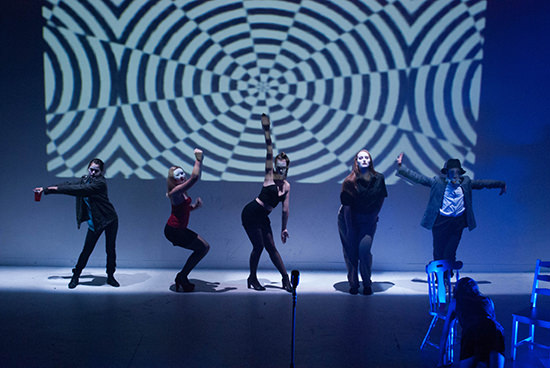
Franziska, Performance/Theatre students, University of Wollongong
Kevin Ng started out as a youngster at Shopfront Contemporary Arts & Performance in Sydney, trained at UOW and has returned to Shopfront where he recently directed three senior ensemble members— Maud Mitchell, Emma Douglas and Adara Eyre—with Steve Wilson-Alexander, another UOW graduate, in Welcome To My World. Ryan was impressed by Ng’s clever exploitation of the theatre workshop model. Appelspiel’s Nicole Kennedy is the Co-Artistic Director of Crack Theatre Festival 2016, part of Newcastle’s national arts event, This is Not Art (TINA) and Jackson Davis is now a casual teacher at UOW. Nat Randall, of the collectives Team MESS and Hissy Fit has performed solo works, appeared in the UK and in the 2016 Next Wave Festival, which was directed by Georgie Meagher, a former Team MESS collaborator. And Jen Medway is resident dramaturg at the Australian Theatre for Young People (ATYP).
Chris Ryan’s wowed by Canberra science-theatre ensemble Boho Interactive’s The Best Festival Ever: How to Manage a Disaster, which featured in Performing Climates (part of the Performance Studies International 2016 Performance Climates conference in Melbourne after appearing in London and Stockholm and then recently played in Sydney where Ryan saw it (see review). The cast includes UOW alumni and Appelspiel members Nathan Harrison, Rachel Roberts and Nicole Kennedy in a work that interactively sharpens its audience’s minds about managing and changing systems of thought.
Ryan tells me about a new work from Appelspiel (Kennedy, Harrison, Roberts, Emma McManus, Mark Rogers, Troy Reid, Joseph Parro and Simon Binns). Titled Jarrod Duffy Is Not Dead, the performance is based on the disappearance in 2010 of a fellow student two weeks before he was due to perform in an Honours show. The work, supported by Adelaide’s Vitalstatistix through their Adhocracy program and a HotHouse Month in the Country residency, concerns the loss, search and recovery of Jarrod and was seen in development in April this year in Merrigong Theatre Company’s Make it @ Merrigong program.
Ryan says of Appelspiel that “they turned the distance of Wollongong from Sydney to advantage, going to see everything they could in the city and then arguing about it all the way back on the 90-minute train trip. It established the sense of playfulness you see in their work. Seeing them with Boho, I thought, perfect.”
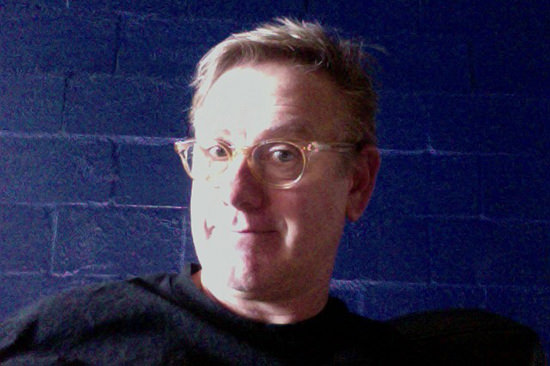
Chris Ryan
About Chris Ryan: from performer to director & teacher
Although I know of Ryan’s impressive history in his work with the Sydney Front, version 1.0, PACT productions and numerous outside-eye roles, I’m curious about his background. He tells me he nursed in Adelaide for a few years, directed the annual hospital review and then left that career behind, attending movement classes run by the legendary Madam Zora Semberova (1913-2012) who had just left Flinders University and set up a studio in the back of her home to teach mime and movement. “Her practice was not always…pleasant but hugely influential, not only physically but visually. I’m a bit dyslexic but the advantage is that I see patterns and structures very easily; that combined with her work has been a great foundation. She’d say, ‘You have the jellyfish buttocks.’ At 6pm would lock out anyone who was late for class.”
He then worked with director Gale Edwards’ company Energy Connection before moving to Sydney where he took classes with Kinetic Energy and made use of tuition and space made available to performers by the One Extra Dance Company. He also encountered Richard Lawton, ex-KISS: Theatre Research Company, Rotterdam. In 1985 a performer pulled out of a One Extra production, so Ryan was invited to join Clare Grant, John Baylis, Roz Hervey and Julie-Anne Long in Dinosaur (1985), a highly structured, improvisation-based work directed by One Extra choreographer Rhys Martin, who had worked with the Reinhild Hoffman’s dance theatre ensemble in Germany. The work featured music by Elena Kats Chernin. The Dinosaur experience, says Ryan, in part triggered the formation of The Sydney Front with Ryan, Grant, Baylis and Hervey among its initial members (the company’s works are available on DVD or for streaming from artfilms as is Clare Grant’s documentary Staging the Audience: The Sydney Front).
Ryan cites Clare Grant as a significant influence on his teaching, visiting her performance classes at UNSW, where she taught and is now an Honorary Lecturer, and observing her “incredibly generous ways of working with a group and seeing her pull something out of an impro that I didn’t see coming. And then there is our ongoing conversation about the pedagogy of performance making.”
After The Sydney Front disbanded in 1994, Ryan became Artistic Director of PACT Theatre (1997-99) and set up the IMPACT Ensemble. After which he taught movement classes and “hung out with PACT directors Regina Heilmann and Chris Murphy as outside eye.” He taught at ACTT (Actors College of Theatre and Television, now AFTT, Academy of Film Theatre and Television) as a movement tutor and was involved in the early years of version 1.0, one of the most significant Australian performance ensembles of the last two decades.
I ask Ryan about the move from the performance scene (where he continues to make notable contributions) into the academy. He tells me, “I felt I’d lost my mojo for performance over a couple of years and then Tim Maddock approached me to teach at UOW. It felt serendipitous ‘to put up my ballet shoes’ and teach.” Many are the students and graduates grateful that he did.
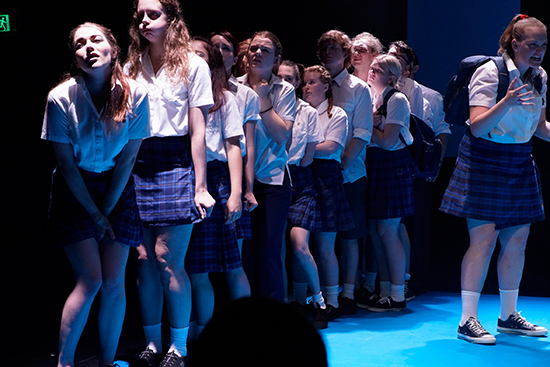
Lyrebird, Performance/Theatre students, University of Wollongong
For details about the University of Wollongong’s School of the Arts, English and Media Bachelor of Performance and Bachelor of Creative Arts (Theatre) degree programs, visit the website.
RealTime issue #134 Aug-Sept 2016






